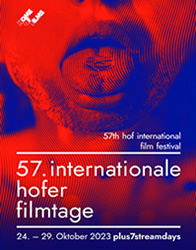Becoming established
For the festival’s third edition in 1969, the Cine-Center Hof (from then on the event’s organiser) went looking for support at the city hall. As the councillors debated, one of them made the unforgettable remark,
“All of these things contribute to the downfall of our culture, and every single Mark spent would be wasted.”
One thousand Marks, half the sum requested, however, were deemed a reasonable enough investment. The 3rd annual festival took place for the first time at the Central Theater – where it was to remain. The cinema, Hof’s largest, accommodated 900 seats back then. Not until 1976, just in time for the festival’s 10 year anniversary celebration, was the cinema divided into three and later, bit by bit, expanded to six venues. Amazingly, the largest cinema was occasionally even sold out during the festival. And it was almost packed when, in 1969, Hans W. Geißendörfer, then an unknown, presented DER FALL LENA CHRIST (“The case of Lena Christ”), a film about the authoritarian structures of society and its institutions.
However, it did occur that the audience demanded a film to be stopped. And once, during the 3rd festival, a screening was indeed interrupted: by public demand, the screening of UNTERMANN – OBERMANN (“Bottom man – top man”) was cut short.
In the 1969 festival program Heinz Badewitz wrote, “Anyone can show their film in Hof. The only ‘censorship’ that takes place is the limitation to five screenings.” This still held true a year later when Fassbinder’s GÖTTER DER PEST (GODS OF THE PLAGUE) and Herzog’s AUCH ZWERGE HABEN KLEIN ANGEFANGEN (EVEN DWARFS STARTED SMALL) were shown and two little cartoons – their heroes were PORNO-HUGO and MICKY MAUS IN VIETNAM – raised a storm of jubilation. Then a new concept was necessary. ‘Five years is a dangerous age for a festival’, the director said. To prevent a crisis, he decided to end the totally open access to the film festival: from then on, a conscious pre-selection would be made.
1971 saw the first German premiere – and only five years later, things were far enough along that all German films would be shown only as world premieres. The first was TUET ALLES IM FINSTERN, UM DEM HERRN DAS LICHT ZU ERSPAREN (“Do everything in the dark to save the Lord the light”), a morbid collage by Daniel Schmid of the Fassbinder team, the boss of which, present in body and soul, answered journalists’ questions with,
“Hof will always be daft, the films won’t help.”
Not much later, Wim Wenders would go on to create a by far friendlier slogan – Hof, he quipped, meant “Home of Films”. And Werner Herzog, who presented his FATA MORGANA in 1971 and shone as the king of goal scorers in the FC Film Festival football team, approved of the festival back then already.


